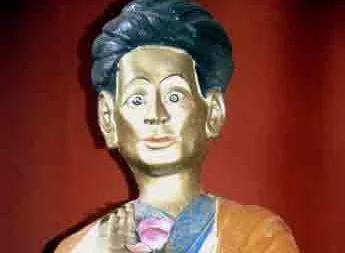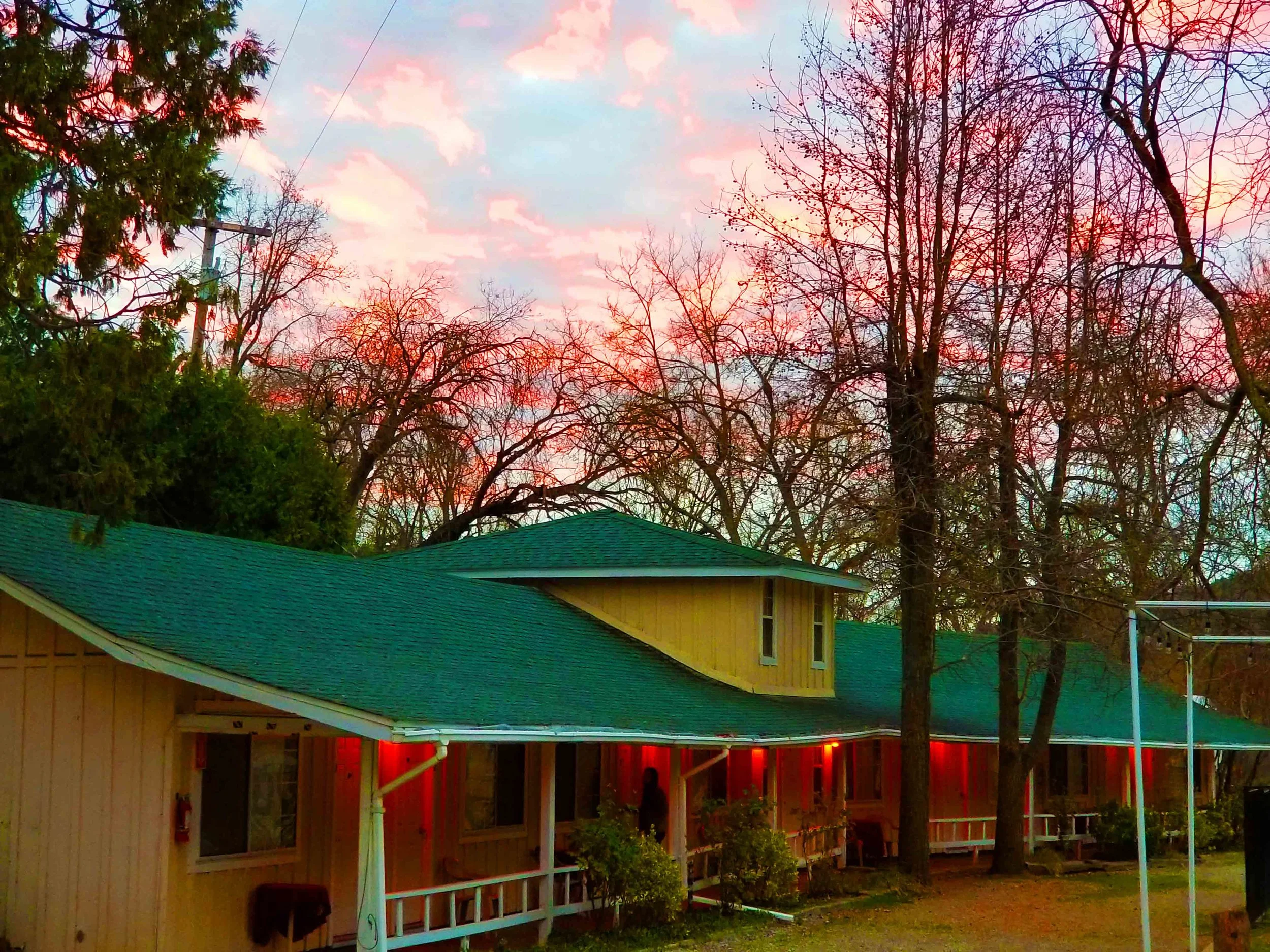If traffic is not the cause for complaint in Los Angeles, it is the weather. April Overcast followed by May Gray followed by June Gloom…not that I ever go, but I long for beach weather. My internal visual thinking, me, forever prostrate, worshiping the sun from the shade, my head propped up against a tree in perfect viewing position.
May Gray
What I consider Spring-like weather, by any reasonable estimation, is late this year. Living in Los Angeles, below sixty degrees post-February I experience as I imagine the Antarctic. The Happy Light on my desk blinds for hours combating May Gray and the resulting California Seasonal Affect Disturbance (CSAD).
Retreat in Myanmar
Annual Metta Jhana retreat
Winter Retreat
I am getting off to a slow start to 2018, what with the hectic holiday build up, The Meaningful Life Winter Retreat, and then a bad bout of the flu. Speaking of the retreat, I think we have worked out the bugs at the new retreat center, so that the retreat container really supports the work we are doing.
Metta, Karuna, Mudita and Upekkha
From a practice perspective, perhaps focus on developing patience for everyone catch up in their conditioning. Metta, Karuna, Mudita and Upekkha. Loving-kindness, Compassion, Sympathetic Joy and Equanimity. Also, some focus on emotional regulation could come in handy. I would also suggest that you keep Sangha close.
A Note From George (November 2017)
Mettagroup is offering The Meaningful Life Winter Retreat this year at Seven Circles Retreat Center in the Sierra Nevadas from December 26, 2017 through January 6, 2018. We use a Metta-Vipassana format for our retreats, and I want to talk through the differences between a Metta-Vipassana retreat and a traditional Vipassana retreat.
The first four days of the retreat are organized around Metta Jhana practice, developing high concentration states using Metta (kind) mind as the meditation object. In the early stages of developing Metta Jhana practice, you develop the skill to cause the arising of Metta (kind) mind whenever you want to; in the middle stages of practice you develop the skill to sustain Metta mind for as long as you want to; and in advanced stages of practice, you explore how the view through Metta mind changes the way you perceive self and world, often eliminating the negative, critical self-talk that poisons the experiences of life for many. Most of us who use negative, critical self-talk do so to regulate our emotional reaction to the conditions of the present moment. One thing neuroscience tells us about emotional regulation is that we do not have a choice about whether we regulate or not; but we do have some agency in how we regulate. We can train our minds to use beneficial strategies for emotional regulation completely replacing the negative ones. This is one of the principle benefits of Metta Jhana practice.
Metta Jhana states can also be very blissful. But, bliss is not the end game of practicing Metta Jhana, the end game remains classical enlightenment. The purpose of Metta-Vipassana practice is to concentrate the mind, make the mind kind to itself, and then jump with Metta mind into Vipassana practice for the last five days of the retreat.
Mettagroup retreats use the Sixteen Stages of Insight as the Dharma map for developing insight. We move through the stages exploring the insights described in each stage. The typical hindrances/difficulties (wanting something else, not wanting what is, sleepiness, restlessness, harsh self judgement, dysregulated emotions, and so on) I have so often countered on the teaching side of straight Vipassana or Mindfulness retreats from students, tend not to come up in the Metta-Vipassana format. Concentration is already established, the mind is kind toward itself, and emotional regulation using Metta practice is available to replace critical self judgement. So, the body/mind can be explored with great precision and ease. This was a surprising outcome - it had not occurred to me that focused practice on Metta at the beginning of a retreat could dampen or eliminate the distress experienced by so many yogis practicing Vipassana.
Because this retreat is part of The Meaningful Life teachings, Mettagroup includes descriptions of Attachment Theory informed mind states as part of the exploration of view. We find that this is a useful way to explore the direct link between early conditioning and the way that conditioning effects how we experience self and world. Our view of self and world comes online so early, we are often in the position of the fish asking, “What water?” when trying to tease out the distortion of our conditioned view from what we are sensing in the here and now. Because Attachment Theory describes in such a direct way the common distortions of view, it acts like the illustrations we have always hoped for in unraveling the knots in our tangled personal narratives. The processes of seeing the view of attachment conditioning can then be applied to unraveling enlightenment. A total win-win!
On the practical side, Mettagroup wants as many students as possible to deepen their practice through retreat, so scholarships are available - get in touch with the office at 213-378-0489 to find out more. See you there or be square.
Love to you,
George
A Note From George (October 2017)
In October, on the Vipassana side, Morning Meditation will explore emotional regulation, working with the Noting Feeling States technique. This technique brings sensory clarity to the embodied emotional experience and develops equanimity with emotional reactivity. We will then explore the personal, conditioned, emotional-regulation system we each developed in our family systems, with attention on developing antidotes to negative self-talk using the Investigating Self-Generated Emotion meditation strategy. On the Metta side, we will begin a Forgiveness Practice cycle.
Registration for Mettagroup’s March 2018 The Meaningful Life Intensives open on October 15th. There are 20 spaces maximum in each training (we expect full trainings, just saying). Intensives meet twice a month on Wednesday evenings.
The Meaningful Life Level 1 training offers basic instruction in Buddhist theory, Attachment Theory, and meditation technique with an emphasis on developing a daily practice. This training is appropriate for people at any level of meditation practice (even people without a practice), and is a prerequisite for the next levels of training.
We’re also very excited to offer The Meaningful Life Level 2 Intensive for the first time. In this class, the basic instructions from Level 1 will be put to good use exploring the nature of attachment strategies as they manifest in daily life. Working with a meditation mentor, your attachment strategy will be individually evaluated so you can develop the meditation-based, metacognitive skills necessary to shift your relationships toward secure functioning. A great part of our excitement in offering Level 2 is that each class will include practice of Daniel Brown’s Idealized Parent Figure protocol, a meditation strategy for remapping the internalized working model of self and world toward earned security. To be eligible for this class, you will need to have completed a Level 1 training or any of the previous The Meaningful Life or Meditation Interventions for the Addiction Process trainings we’ve offered in the past. (If you have any questions about eligibility, please call the office to discuss.)
In addition, we plan to offer a Meditation Interventions for the Addiction Process (MIAP) Intensive in March as well. We need to have at least 15 registered students to make the offering, and as of today we have 13 people on our interest list. MIAP is a relapse prevention training structured around G. Alan Marlatt’s relapse prevention research, focusing on four of the main pathways to relapse (Craving and Urging; Stress, Anger and Depression; Persistent Negative Emotions; and Difficult Interpersonal Relationships), so you can develop strategies to stay on the path. The training is for both substance and process addictions (most people have a combination of both), and works with both abstinence and harm reduction models. We believe that the underlying cause of addiction is attachment disturbance, and we emphasize in this training relationship skills development and attachment repair. Please sign up on our MIAP interest list, and when we have enough interest we will schedule the training (hopefully in March!).
If you have any questions about these upcoming intensives, please call the office at 213-478- 0489 to set up a phone call with me, and I will happily answer any questions.
On a personal note, if you are in New York this fall through the spring, I will be showing 80 of my photographs, five of my films, and on a couple of occasions reading some of my poetry as part of Club 57 at MoMA. The show if focusing on the work of artists who were active in New York’s Lower East Side from 1979 to 1983, a period that is increasingly compared to Paris in the early 1920s. The opening is on Halloween. What to wear? What to wear?
Happy sitting everyone, love to you,
George
A Note From George (September 2017)
I hope everyone is happy and well. Mettagroup is excited to announce two new trainings for the fall of 2017: the Idealized Parent Figure Work Group, and Facilitation and Mentoring Training for our long-running intensives The Meaningful Life and Meditation Interventions for the Addiction Process.
The Idealized Parent Figure (IPF) protocol is adapted from the Tibetan Mahamudra meditation practice by Daniel P. Brown et al, and is designed to repair attachment disturbances in adults. During the therapy, students imagine ideal relationships with ideal attachment figures replacing the actual relationship experiences with their actual attachment figures, updating their insecure attachment strategies with a secure working model of self and others.
In delivering IPF to students, Mettagroup will develop three levels of care. Basic IPF will be included in first level curricula of The Meaningful Life (TML) and Meditation Interventions for the Addiction Process (MIAP) led by Mettagroup facilitators/mentors. As practice deepens, students will be supported psychologically by licensed psychotherapists in addition to Mettagroup facilitators/mentors. Some students may require a higher level of care than a Mettagroup facilitator and/or psychotherapist can provide, so a third level of additional support by licensed psychiatrists will be available as needed. Facilitators/mentors, psychotherapists and psychiatrists working with Mettagroup will need to have a practical understanding of the TML/MIAP curricula, including a developed meditation practice, and a working knowledge of IPF.
At Mettagroup, we feel very strongly that the IPF protocol should be widely available to people living with attachment disturbance, so we do not wish to restrict dissemination of IPF training to people only interested in the TML/MIAP approaches. To that end, we have divided the training into two groups.
The IPF Protocol Work Group will train practitioners to use IPF, and provide ongoing support. Members will learn IPF by doing, and will be expected to both facilitate IPF for a member of the group and to receive IPF facilitation from a member of the group. Dan Brown will support the training during a two-hour video conference call every four to six weeks. Training in how to use the Adult Attachment Interview, and scoring services will be available to members. The group is open to TML/MIAP facilitators/mentors, licensed psychotherapists and psychiatrists. The group will be ongoing, and supported by member’s monthly dues.
In addition, Mettagroup will offer an Attachment Theory and Meditation Basics course for therapists and psychiatrists who are interested in engaging this work but may not feel informed enough on the concepts and language of mindfulness meditation (and how it relates to attachment theory) to jump right into a work group. If you're interested in this course, follow this link and fill out the form to get in touch.
Mettagroup's Facilitator and Mentoring Training is a continuation and expansion of our existing mentoring training program that many of you may be familiar with. Focused on our signature intensives, The Meaningful Life and Meditation Interventions for the Addiction Process, it will have a special emphasis on teaching MIAP in treatment centers. The new format reflects the extensive expansion of these courses.
TML has been expanded to five levels of training, each in a six-month module. MIAP is offered in a 12-week, 36 class intensive outpatient format, and a six-month intensive post-acute treatment training. Students working with MIAP move to TML after stabilizing in their recovery from process and substance addictions. Meditation Mentoring training is a central part of our strategy. Students in the TML/MIAP Facilitator and Mentoring training will be supported in teaching classes, and working with mentees.
I hope that we have peaked your interest. We are gathering names and contact information for those interested in these trainings. Please follow the links above to fill out the forms on our website and if you have questions, please feel free to call our office at 213-378-0489 to set up a time to speak with me directly.
Thanks,
George
A Note From George (August 2017)
Mettagroup is changing the way we will offer The Meaningful Life teaching, our meditation-based attachment disturbance repair. Until now, we centered the teaching on ten or nine-month classes, repeating the same level of instruction once per year. Responding to the requests of our students, we have developed five levels of training, each for a six-month period, each with a different emphasis.
Level One training (beginning August 2nd) will focus on teaching the meditation techniques used in information on Attachment Theory, attachment disturbance repair, emotional regulation, and the development of mind states associated with secure attachment and spiritual maturity. Level One training is a required prerequisite for the additional trainings.
Level Two training (beginning in March of 2018) will focus on developing the skill set of secure attachment in relationships, shifting your current relationships from the native attachment strategy you developed in your family system to earned secure dynamics. This training will incorporate meditation mentoring, the mindfulness-based strategies, adapted from Shinzen Young’s teaching, for the development of the basic mind states and emotional regulation, and group Idealized Parent Figure protocol developed by Dan Brown at Harvard. The IPF protocol is based on the Tibetan Maha Mudra practice, where you replace the model of how relationships work you developed in your actual system with a working secure model.
Level Three training will focus on doing the deep work of uprooting the original conditioning that caused the attachment disturbance using the mindfulness-based strategies, and a personalized IPF protocol based on the outcome of your Adult Attachment Interview.
Level Four training will focus on who you pick to be in relationship with, shifting who you find attractive from the native attachment strategy of your childhood conditioning to an earned secure strategy using mindfulness-based strategies for the development of intermediate and advanced level mind states, and Dan Brown’s Idealized Partner Figure protocol.
Level Five training will focus on developing interpersonal conflict resolution strategies that work in harmony using mindfulness-based strategies and Dan Brown’s Conflict Resolution Inventory.
We are very excited to expand The Meaningful Life teachings. Each level can be repeated as often as required for the insights offered to be deeply integrated. If you have any questions, please feel free to call us at 213-378-0489, and we will be happy to ask any of your questions.
I hope you are happy and well,
George
A Note From George (July 2017)
There's some big changes happening with Mettagroup's intensive classes. Instead of single ten-month programs, we are dividing The Meaningful Life and Meditation Interventions for the Addiction Process into five levels of six-month classes. This expands and deepens the training, while simultaneously making it more digestible for students. We're very excited about it!
The first level, beginning this August, will offer instruction in Buddhist theory, Attachment Theory, relapse prevention strategies, and in-depth meditation techniques. Subsequent levels will focus on developing secure relationships, uprooting past attachment conditioning, working through conflict resolution strategies, and will draw more deeply on Daniel P. Brown's attachment protocols. If you have any questions about the courses, please feel free to contact Tyson in our office at 213-378-0489 or admin@mettagroup.org to set up a phone conversation with me to discuss further.
For those of you who take part in our Morning Meditation, we will be exploring the third and fourth stages of Insight during July’s sessions.
The third stage is the examination of the Ananta, Anicca and Dukkha (aka Non-Self, Impermanence and Unsatisfactoriness), in which our focus becomes "Nothing Lasts." In watching all sensory experience arise and pass on its own without a self causing it, we experience non-self with no permanent, ongoing, continuous author, creator, doer, maker. In nothing lasting, including ourselves, we experience the unsatisfactoriness of the human condition. This puts us at a crossroads: in one direction is nihilism - nothing lasts, nothing matters, there's no need to participate in life. In the other direction is full engagement - nothing lasts, the moment ends either way, what we miss if we don’t engage every moment is the engagement itself. Franz Kafka says it best: “You can hold yourself back from the sufferings of the world, that is something you are free to do and it accords with your nature, but perhaps this very holding back is the one suffering you could avoid."
The fourth stage is the investigation of impermanence. Wherever we turn our attention, the sensory experience arises and passes. Join me on our daily call to hear more about that!
I hope you are happy and well,
George Haas
A Note From George (June 2017)
June is upon us, and -- drum roll please, can-can line wave kick right to left and back, dumb-da-de-dum -- so we will begin exploring the first four stages of insight from The Sixteen Stages of Insight for the next eight weeks on Monday’s, Wednesday’s and Friday’s Morning Meditation. Applying tried and true Shinzen Young meditation techniques, and with commentary from Mahasi Sayadaw's The Progress of Insight, we will spend two weeks with each stage.
Beginning with the Analytical Knowledge of Body and Mind (nama-rupa- pariccheda-ñana) we will explore the actual activity of sensing: seeing, hearing, tasting, smelling and feeling; the capacity to sense something contacts an object that can be sensed, and a consciousness of that sensing experience arises, which awareness knows.
Building on the experience of sensing, we will develop Knowledge by Discerning Conditionality (paccaya-pariggaha-ñana), tracking how this moment is dependent on the conditions of the previous moment, and how the next moment is dependent on the conditions of this moment.
Then, we will explore Knowledge by Comprehension (sammasana-ñana), examining each sensing phenomena through one of The Three Characteristics of Existence, Ananta, Anicca and Dukkha (not-self, impermanence and unsatisfactoriness).
Finishing up July with Knowledge of Arising and Passing Away (udayabbaya-ñana), or flow states.
To continue on to Knowledge of Dissolution (bhanga-ñana) I would recommend some retreat practice! BHANGA OR BUST!! There is so much freedom to be had in understanding the nature of sensing and what we make the sensing experience into. How we make self and world. Enjoy!
- George Haas (from retreat in upstate New York)











